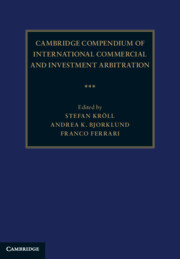Book contents
- Cambridge Compendium of International Commercial and Investment Arbitration
- Cambridge Compendium of International Commercial and Investment Arbitration
- Copyright page
- Contents
- Figures
- Tables
- Contributors
- Preface
- Part I Foundations
- Part II Public Law Questions Relating to Arbitration
- Part III Stakeholders in Arbitration
- Part IV Applicable Law
- Part V Jurisdiction of the Arbitrator
- Part VI The Arbitral Tribunal
- Part VII Procedural Questions in Arbitration
- 36 Implicit Consent and Unanticipated Risk in Class, Mass, and Collective Arbitration
- 37 The Principle of Equal Treatment in International Arbitration
- 38 Joinder of Third Parties
- 39 Evidentiary Issues in International Arbitration
- 40 Provisional Measures by Arbitrators and Emergency Arbitrators
- 41 Setting the Language (or Languages) of Arbitration – and the Impact of Language-Related Imperfections in Post-Award Proceedings
- Part VIII Role of State Courts in Arbitration
- Part IX Awards
- Part X Post-Award Issues
- Part XI Legal Concepts
- Part XII Areas of Concern
- Part XIII Arbitration and Related Fields
- Part XIV EU Law and Arbitration
39 - Evidentiary Issues in International Arbitration
from Part VII - Procedural Questions in Arbitration
Published online by Cambridge University Press: 18 February 2023
- Cambridge Compendium of International Commercial and Investment Arbitration
- Cambridge Compendium of International Commercial and Investment Arbitration
- Copyright page
- Contents
- Figures
- Tables
- Contributors
- Preface
- Part I Foundations
- Part II Public Law Questions Relating to Arbitration
- Part III Stakeholders in Arbitration
- Part IV Applicable Law
- Part V Jurisdiction of the Arbitrator
- Part VI The Arbitral Tribunal
- Part VII Procedural Questions in Arbitration
- 36 Implicit Consent and Unanticipated Risk in Class, Mass, and Collective Arbitration
- 37 The Principle of Equal Treatment in International Arbitration
- 38 Joinder of Third Parties
- 39 Evidentiary Issues in International Arbitration
- 40 Provisional Measures by Arbitrators and Emergency Arbitrators
- 41 Setting the Language (or Languages) of Arbitration – and the Impact of Language-Related Imperfections in Post-Award Proceedings
- Part VIII Role of State Courts in Arbitration
- Part IX Awards
- Part X Post-Award Issues
- Part XI Legal Concepts
- Part XII Areas of Concern
- Part XIII Arbitration and Related Fields
- Part XIV EU Law and Arbitration
Summary
Evidence – its marshalling, disclosure and presentation – lies at the heart of many, if not most, international arbitration proceedings. Yet, perhaps more than any other aspect of arbitral practice, evidentiary issues lay bare the significant divergences between the common and civil law traditions. As result, evidentiary questions can sometimes be among the most contentious that arise in an international arbitration, particularly when a dispute involves parties and/or counsel from different sides of the common law/civil law divide.In this chapter, we outline the process by which evidence is used in international arbitration and highlight some particularly thorny issues that can arise, including in relation to the document disclosure process, the admissibility of evidence and the use of evidence at an evidentiary hearing.It is important that parties and counsel consider these evidentiary issues carefully – and early in the arbitral process. Although every tribunal is different, international arbitration is fundamentally party-driven.Parties should therefore be proactive in fostering an efficient, effective, and fair process as it relates to the gathering, production and use of evidence in an international arbitration proceeding.
Keywords
- Type
- Chapter
- Information
- Publisher: Cambridge University PressPrint publication year: 2023



